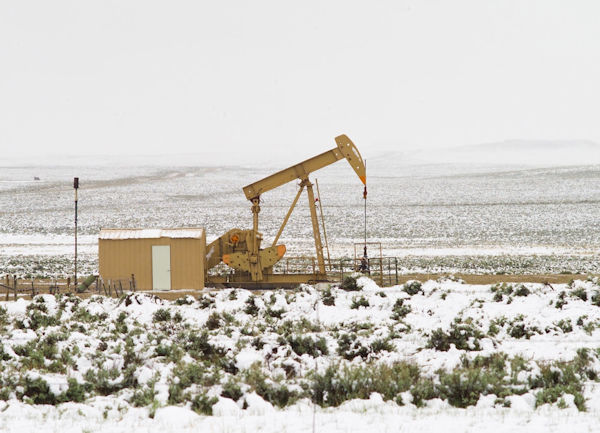SEJournal Online is the digital news magazine of the Society of Environmental Journalists. Learn more about SEJournal Online, including submission, subscription and advertising information.
 |
| A pump jack in the Moneta Divide oil and gas field east of Shoshoni, Wyo., where a local reporter learned a proposed surface water discharge permit would result in massive discharges of pollutants into creeks and a state park reservoir, as well as a town drinking water supply. Photo: Angus M. Thuermer Jr./WyoFile. Click to enlarge. |
Inside Story: Rural Reporter Turns Routine Permit Into Award-Winning Investigation
Angus Thuermer Jr. is no stranger to the pages of Inside Story, having appeared in mid-2020 to discuss his outstanding small market beat reporting for coverage of water law, gas wells, unlined pits and chronic wasting disease for WyoFile.com. This time around, Thuermer discusses coverage that challenged assumptions about oil field pollutants, winning him a second-place prize for outstanding investigative reporting (small newsroom or circulation) at the Society of Environmental Journalists’ 2020 Annual Awards for Reporting on the Environment.
SEJ’s judges lauded Thuermer, who they said “dug deeply into what might have been a routine state permit for dumping oil field waste into protected waters [and] tracked how regulators' jargon hid acceptance of flawed industry assurances and the likelihood of degraded water quality.” The stories stirred public opposition, and ultimately EPA criticism forced the state to withdraw the permit. SEJournal Online followed up with him for a new conversation about his award-winning work.
SEJournal: How did you get your winning story idea?
Angus Thuermer Jr.: I had been covering the Wyoming Department of Environmental Quality for only a few years, mostly regarding winter ozone air pollution near a major gas field, when the agency published a legal notice about a pending oil field surface water discharge permit. The watchdog group Wyoming Outdoor Council alerted me to an ongoing problem: Two energy companies that had been seeking for years to expand the Moneta Divide gas and oil field didn’t have a solution to dispose of salty “produced water” that’s pumped from underground to release the gas. The permit renewal proposed by state regulators, who implement federal water quality laws, would have allowed massive discharges of pollutants into creeks and a state park reservoir above a Class I river and the drinking supply for the town of Thermopolis.
‘Th[e] challenge of interpreting and describing
the proposal required understanding the
science and jargon, finding specialists and
prying information out of reluctant bureaucrats.’
— Angus Thuermer
SEJournal: What was the biggest challenge in reporting the piece and how did you solve that challenge?
Thuermer: The state announced its proposal to allow the discharge of millions of gallons of polluted water a day and thousands of tons of pollutants a month in a bland legal announcement no ordinary person would read. It linked to exhaustive papers filled with technical language and jargon that sought to justify the discharges. This challenge of interpreting and describing the proposal required understanding the science and jargon, finding specialists and prying information out of reluctant bureaucrats.
SEJournal: What most surprised you about your reporting?
Thuermer: I was surprised the Wyoming Department of Environmental Quality ultimately decided to reject the companies’ plan to discharge pollutants into drainages above Boysen Reservoir. Nevertheless, the DEQ continues studies that could change streams’ environmental classifications to allow future discharges and it also could approve discharges directly into the reservoir via a potential pipeline. Given the overwhelming influence of oil and gas operators in Wyoming, I was not surprised but disappointed that so many people would accept the pollution. I also was disappointed that local elected leaders didn’t take stronger positions on protecting their water quality.
SEJournal: How did you decide to tell the story and why?
Thuermer: The series developed as WyoFile’s stories about the pollution plan spurred residents to request public hearings. Coverage also advanced as other environmental regulators unveiled more details about the proposed expansion of the 511-square-mile gas and oil field. WyoFile decided it needed to travel to the affected communities and talk to people there, including residents, energy-field workers, elected politicians and others.
SEJournal: What would you do differently now, if anything, in reporting or telling the series and why?
Thuermer: The Society of Environmental Journalists awards entry included only about a third of the stories WyoFile did on the controversial Moneta Divide gas- and oil field expansion and pollution control plan. I juggled this topic with other stories and would have liked to have had more time to meet with and photograph the affected people. While we reported the statements of workers, doctors, mayors and others, one more chance to meet with some of the affected parties in their affected environments would have added to the series.
SEJournal: What lessons have you learned from your project?
Thuermer: The project reaffirmed the importance of public records and notices in informing the public about what its government is doing. Reporters and the public need to know and understand the obscure places these frequently boring and obtuse notices are posted and must put in the time to monitor them regularly. News organizations and the public must continue to fight for access to public records and timely notice of development proposals or they will be cut out of the decision-making process.
SEJournal: What practical advice would you give to other reporters pursuing similar projects, including any specific techniques or tools you used and could tell us more about?
Thuermer: Question everything. Find experts. If you think you should seek a public record, do it.
SEJournal: Is there anything else you would like to share about this story or environmental journalism?
 |
| Credit: Price Chambers |
Thuermer: I’m a reporter writing about natural resource issues and other topics. If I were to call or announce myself an environmental journalist I believe most people in Wyoming would prejudge and classify me as an environmentalist on a mission.
Angus M. Thuermer Jr. reports about natural resources, criminal justice, federal lands, policy and other issues across the state, topics that have engaged him as a Wyoming journalist for the past 42 years. He lives in Jackson and joined WyoFile in the summer of 2014. Thuermer reported and photographed for many years for the Jackson Hole News, and was editor of that paper and of the Jackson Hole News & Guide. He also served on the board of the Wyoming Press Association and is a past president of that organization. Thuermer settled in Jackson in 1978 after a stint as an alpinist, rock climber and Wyoming oil field roughneck. He graduated from Yale with a BA in English in 1974 after growing up in the Washington, D.C. area and overseas. Thuermer enjoys fly-fishing, photography, skiing, mountaineering, boating, hunting and wilderness excursions where the outcome is uncertain. You can contact him at angus@wyofile.com.
* From the weekly news magazine SEJournal Online, Vol. 6, No. 42. Content from each new issue of SEJournal Online is available to the public via the SEJournal Online main page. Subscribe to the e-newsletter here. And see past issues of the SEJournal archived here.














 Advertisement
Advertisement 



